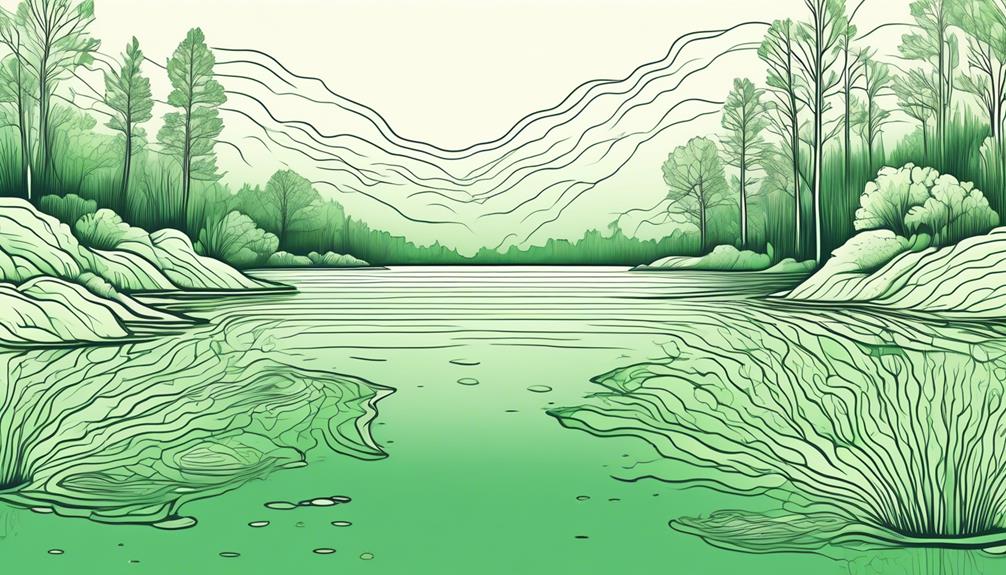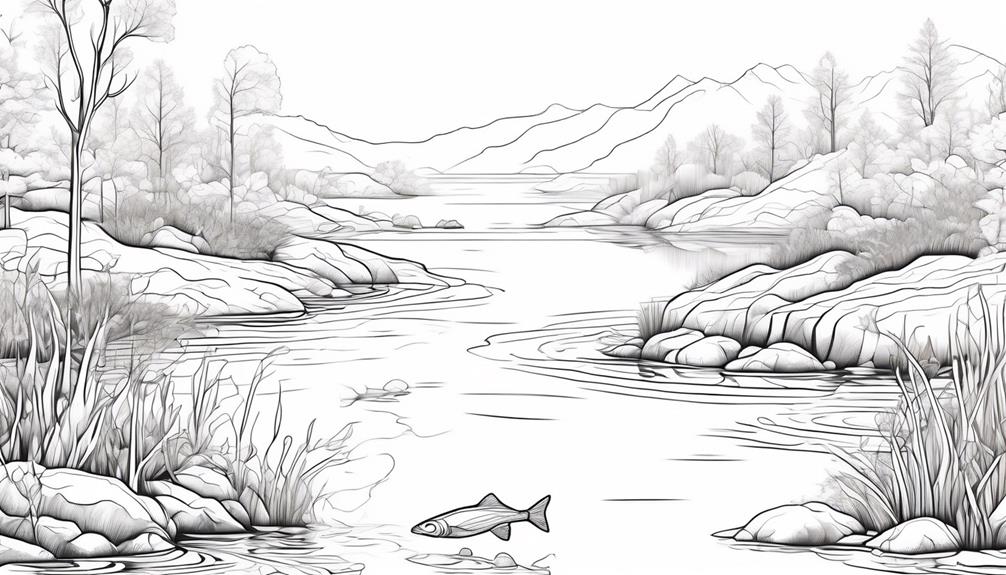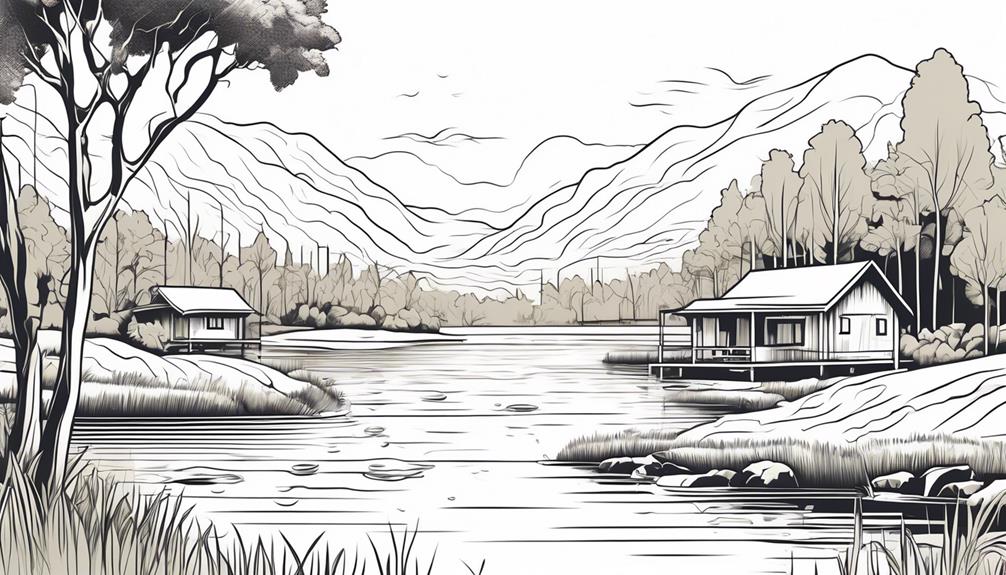Imagine standing on the banks of a river, its once vibrant waters now resembling a sluggish, polluted stream. Like a delicate ecosystem teetering on the edge of collapse, freshwater ecosystems are facing the profound impacts of climate change.
From reduced availability of freshwater to disrupted aquatic habitats, the consequences are far-reaching. But what exactly are these impacts, and how do they affect not only the environment but also the communities that depend on these precious resources?
Join us as we dive into the complex web of climate change's effects on freshwater ecosystems, and discover why this issue demands our attention and action.
Key Takeaways
- Climate change is causing a reduction in freshwater availability, leading to droughts, decreased snowpack, and depleted groundwater.
- Rising temperatures and changing precipitation patterns are impacting freshwater quality, leading to nutrient runoff, harmful algal blooms, and increased salinity.
- Aquatic ecosystems are being disrupted by climate change, with species extinction, altered species composition, and habitat destruction.
- Climate change is disrupting food chains in freshwater ecosystems, leading to shifts in predator-prey relationships, altered nutrient cycling, and impacts on ecosystem services and human communities.
Reduced Freshwater Availability
Reduced freshwater availability due to climate change is posing significant challenges for various sectors and ecosystems worldwide. Climate change is causing a decrease in the amount of freshwater available, which is expected to worsen as water demand increases and supplies diminish in many regions. Warmer temperatures are leading to declining snowpack and earlier snowmelt, affecting the timing and quantity of water supply. Persistent droughts and increased demand are depleting groundwater, further reducing water supplies. Extreme weather events like heavy rainfall and droughts, intensified by climate change, are exacerbating the problem.
The impacts of reduced freshwater availability are far-reaching. Agriculture, a sector heavily reliant on freshwater, is being affected as farmers struggle to irrigate their crops. Energy production is also being challenged, as hydropower becomes less reliable due to reduced water flow. Inadequate freshwater availability hampers sanitation efforts, making it harder to provide clean water and proper sanitation facilities. Additionally, reduced freshwater availability is threatening the survival of plants and animals that depend on freshwater ecosystems, endangering their delicate balance.
Declining Water Quality
Rising temperatures and changing precipitation patterns are causing a decline in the quality of our freshwater resources. Climate change is impacting freshwater ecosystems, leading to declining water quality. Increased rainfall can result in more runoff of sediments, nutrients, and pathogens, which harm water quality. Nutrient runoff, combined with warming water temperatures, can trigger harmful algal blooms that negatively affect aquatic life and human use of water. Saltwater intrusion is another consequence of climate change, as rising sea levels and droughts can increase the salinity of water bodies and groundwater, posing a threat to freshwater supplies. Additionally, extreme weather events strain aging water infrastructure, increasing the risk of dam and levee failures and threatening water utilities. Climate change also exacerbates the impacts of pollution and habitat destruction, intensifying the vulnerability of freshwater ecosystems. To better understand the impacts of climate change on freshwater resources, consider the following table:
| Climate Change Effects | Impacts on Freshwater Quality |
|---|---|
| Increased rainfall | More runoff of sediments, nutrients, and pathogens |
| Nutrient runoff and warming water temperatures | Harmful algal blooms affect aquatic life and human use of water |
| Rising sea levels and droughts | Saltwater intrusion increases salinity of water bodies and groundwater |
| Extreme weather events | Strain on aging water infrastructure, leading to failures and risks to water utilities |
| Exacerbation of pollution and habitat destruction | Intensified vulnerability of freshwater ecosystems |
As climate change continues to alter our environment, it is crucial to address these challenges and protect the quality of our freshwater resources.
Disrupted Aquatic Ecosystems
Disrupted aquatic ecosystems due to climate change can have severe consequences. Species extinction is a major issue, as changing conditions can render certain species unable to survive.
This disruption also alters food chains, as the loss of certain species can have cascading effects on others.
Additionally, the overall decrease in water quality further exacerbates these issues, putting freshwater ecosystems at risk.
Species Extinction
The survival of aquatic species in freshwater ecosystems is threatened by changes in water temperature caused by climate change. This can have severe impacts on the delicate balance of these ecosystems, leading to species extinction.
Here are some key points to consider:
- Disruption of precipitation patterns from climate change can result in more frequent droughts and floods, negatively affecting freshwater habitats and species.
- Rising temperatures and altered flow patterns can contribute to the extinction of certain aquatic species in freshwater ecosystems.
- Climate change also increases the risk of water pollution, further endangering species and disrupting the ecosystem's balance.
- The loss of biodiversity in freshwater ecosystems due to climate change can have far-reaching impacts on the overall health and functioning of these vital habitats.
It is crucial to address the impacts of climate change on freshwater ecosystems to protect the species that rely on them and maintain the essential services they provide.
Altered Food Chains
As the impacts of climate change extend to freshwater ecosystems, the altered food chains within these habitats become a concerning issue. Climate change disrupts the intricate balance of predator-prey relationships, leading to changes in the abundance and diversity of aquatic species. Shifts in water temperature, caused by climate change, affect the timing of food availability and reproduction for aquatic organisms, disrupting the natural food chain. Changes in precipitation patterns and extreme weather events alter the input of organic matter and nutrients into freshwater ecosystems, which can have a significant impact on the base of the food chain. Additionally, invasive species, favored by warmer conditions, can outcompete native species, leading to cascading effects on the entire food web of freshwater ecosystems. These disrupted food chains not only affect the ecological communities but also impact the provision of important ecosystem services, such as fisheries and water quality regulation, which in turn affects human communities as well.
| Impacts of Climate Change on Freshwater Ecosystems | Altered Food Chains |
|---|---|
| Unbalanced predator-prey relationships | Changes in water temperature affect timing of food availability |
| Impact on abundance and diversity of aquatic species | Changes in precipitation alter input of organic matter and nutrients |
| Shifts in water temperature affect reproduction of aquatic organisms | Invasive species outcompete native species |
| Changes in precipitation patterns affect the base of the food chain | Cascading effects on the entire food web |
| Impact on provision of ecosystem services | Affects ecological and human communities |
Decreased Water Quality
Climate change has a detrimental impact on freshwater ecosystems, leading to a decrease in water quality and disrupting aquatic ecosystems. Here are some key ways in which climate change affects water quality:
- Increased rainfall can cause more runoff of sediments, nutrients, and pathogens, which reduces water quality.
- Warmer water temperatures and nutrient runoff can result in harmful algal blooms, posing risks to aquatic life and human water use.
- Rising sea levels and drought can lead to saltwater intrusion, contaminating freshwater supplies and harming aquatic plants and animals.
- Extreme weather events strain aging water infrastructure, causing failures and indirectly affecting water and wastewater plants.
- Decreased water availability, changes in temperature and precipitation patterns, and increased risk of water pollution disrupt freshwater habitats and lead to biodiversity loss.
These impacts highlight the urgent need to address climate change and protect our freshwater ecosystems.
Increased Frequency of Harmful Algal Blooms

Climate change is causing an increase in harmful algal blooms. These blooms, fueled by warmer water temperatures, release toxins that harm aquatic life and pose risks to human health. As the frequency of these blooms rises, the ecological balance of freshwater ecosystems is being disrupted, leading to dead zones and compromised water quality.
Algal Blooms and Climate
The increased frequency of harmful algal blooms in freshwater ecosystems is a direct result of rising temperatures and nutrient runoff. Climate change plays a significant role in exacerbating the occurrence of algal blooms, which can have detrimental effects on water quality and aquatic life.
Here are some key facts about the impacts of climate change on algal blooms:
- Harmful algal blooms can create dead zones, where oxygen levels are too low for aquatic organisms to survive.
- Climate change can raise water temperatures, providing favorable conditions for the growth of harmful algae.
- Altered nutrient cycles, caused by climate change, contribute to the intensification of algal blooms.
- Harmful algal blooms can lead to hypoxia, fish kills, and disruptions in the balance of freshwater ecosystems.
- These blooms can also affect the safety of freshwater for human use, impacting drinking water supplies and recreational activities.
The increasing occurrence of algal blooms due to climate change highlights the urgent need to address the impacts of climate change on freshwater ecosystems.
Water Quality Impacts
The increased frequency of harmful algal blooms due to climate change has significant impacts on water quality, posing risks to both aquatic life and human health.
These blooms, caused by nutrient runoff and warming water temperatures, can lead to dead zones in water bodies, endangering the survival of aquatic species. Rising temperatures promote the growth of these harmful algal blooms, disrupting the balance and biodiversity of freshwater ecosystems.
Additionally, changes in precipitation patterns and nutrient cycles can intensify the occurrence and severity of these blooms in freshwater environments. This altered water quality reduces the safety of water for human use, jeopardizing the health of individuals who rely on these freshwater sources.
It's crucial to address the impacts of climate change on water quality to protect the well-being of both aquatic ecosystems and human populations.
Ecological Consequences
Increased frequency of harmful algal blooms is wreaking havoc on freshwater ecosystems, threatening the delicate balance of aquatic life. As climate change continues to impact freshwater ecosystems, the ecological consequences are becoming more apparent. The increased temperature in water bodies promotes the growth of harmful algal blooms, which can have devastating effects. Here are some key impacts:
- Dead zones: Harmful algal blooms are leading to dead zones in water bodies like Lake Erie, where oxygen levels are depleted, impacting wildlife.
- Threat to aquatic life: These blooms can kill aquatic life and disrupt the food chain, affecting the entire ecosystem.
- Human health risks: Harmful algal blooms can make water unsafe for human use, leading to health risks.
- Hypoxia and fish kills: Warmer water holds less oxygen, leading to hypoxia and fish kills due to harmful algal blooms.
- Increased pollution: Changes in precipitation patterns can intensify the pollution of freshwater bodies, worsening the effects of harmful algal blooms.
These ecological consequences highlight the urgent need to address the impacts of climate change on freshwater ecosystems to protect the delicate balance of aquatic life.
Shifts in Species Composition

Shifts in species composition within freshwater ecosystems are a direct result of the changing water temperature and availability caused by climate change. As the Earth's temperature rises, it has a profound impact on the distribution and survival of aquatic species. This, in turn, leads to changes in the types of organisms present in freshwater ecosystems. Climate change alters the habitat suitability for various species, causing shifts in the community structure of these ecosystems.
One of the main ways climate change affects species composition is through rising temperatures. As the water temperature increases, it becomes more challenging for some species to survive in their current habitats. Some organisms may struggle to adapt and may eventually disappear from these ecosystems. At the same time, other species that are more tolerant to warmer temperatures may thrive and become more abundant.
Another factor contributing to shifts in species composition is changes in the availability of freshwater resources. Climate change affects precipitation patterns, leading to alterations in the amount and timing of rainfall. This, in turn, impacts the availability of freshwater resources for different species. Some species may struggle to find enough water to survive, while others may benefit from the changes in water availability.
Loss of Biodiversity
As the species composition in freshwater ecosystems undergoes changes due to climate change, another significant consequence emerges: the loss of biodiversity. This loss of biodiversity has profound impacts on the health and functioning of freshwater ecosystems. Here are five key points to understand the implications of the loss of biodiversity on freshwater ecosystems:
- Imbalance in the food web: Loss of biodiversity disrupts the delicate balance of the food web in freshwater ecosystems. This imbalance can lead to a decrease in the availability of food for certain species, affecting their survival and reproduction.
- Vulnerability to invasive species and diseases: Decreased biodiversity makes freshwater ecosystems more vulnerable to invasive species and diseases. These new entrants can outcompete native species and spread diseases, further destabilizing the ecosystem.
- Cascading effects on the ecosystem: The loss of aquatic species due to climate change and other stressors can have cascading effects on the entire ecosystem. It can impact water quality, nutrient cycling, and the overall stability of the ecosystem.
- Reduced resilience: Declining biodiversity reduces the resilience of freshwater ecosystems, making them less able to adapt to environmental changes. This can make them more susceptible to further disturbances and less capable of recovering from them.
- Human activities exacerbate the impacts: Human activities, such as pollution and habitat destruction, contribute significantly to the loss of biodiversity in freshwater ecosystems. These activities exacerbate the impacts of climate change and further threaten the fragile balance of these ecosystems.
Impacts on Human Communities

Climate change's impact on freshwater ecosystems extends beyond the natural world and directly affects human communities. Changes in water temperatures and availability due to climate change can have significant impacts on human communities that rely on freshwater resources. One major concern is the effect on water supply. Climate change can lead to reduced water supplies and increased demand, which can affect human access to clean water for drinking and sanitation.
Additionally, climate change can impair water quality, posing health risks for communities dependent on freshwater sources. The stress that climate change puts on water infrastructure can also create challenges in providing clean water and sanitation services.
Moreover, the vulnerability of freshwater ecosystems to global warming can have cascading effects on human communities. These ecosystems provide crucial ecosystem services such as water purification, flood control, and habitat for fish and other species that support local economies and livelihoods.
Therefore, it's crucial to address the impacts of climate change on freshwater ecosystems to protect the well-being of human communities.
Frequently Asked Questions
How Are Freshwater Ecosystems Affected by Climate Change?
Climate change affects freshwater ecosystems by reducing water availability, altering water temperature, and disrupting species distribution. These impacts challenge the resilience of these ecosystems, threatening their ability to adapt and survive in the face of changing environmental conditions.
How Does Climate Change Affect Aquatic Ecosystem?
Climate change affects aquatic ecosystems by impacting water quality, changing species composition, and disrupting food webs. These impacts can lead to increased pollution, shifts in biodiversity, and imbalances in the food chain, threatening the health of freshwater ecosystems.
What Is the Biggest Threat to Freshwater Ecosystems?
Climate change poses the biggest threat to freshwater ecosystems. It undermines ecosystem resilience, leading to species extinction and water scarcity. The impacts are far-reaching and urgent action is needed to protect these vital ecosystems.
How Does Climate Change Affect Freshwater Fish?
Climate change affects freshwater fish by impacting their biodiversity, habitat, and food chain. As the climate changes, fish face challenges such as altered water temperature, reduced oxygen levels, and changes in food availability, which can disrupt their survival and overall ecosystem health.
Conclusion
You look out at the once vibrant freshwater ecosystems, now struggling under the weight of climate change. Reduced availability of clean water, declining quality, and disrupted ecosystems have taken a toll.
Harmful algal blooms are becoming more frequent, species are shifting, and biodiversity is being lost.
It's not just the ecosystems that are suffering; human communities are feeling the impact too.
As we face these challenges, remember the importance of collaboration and adaptation to ensure the long-term resilience of our freshwater resources.
